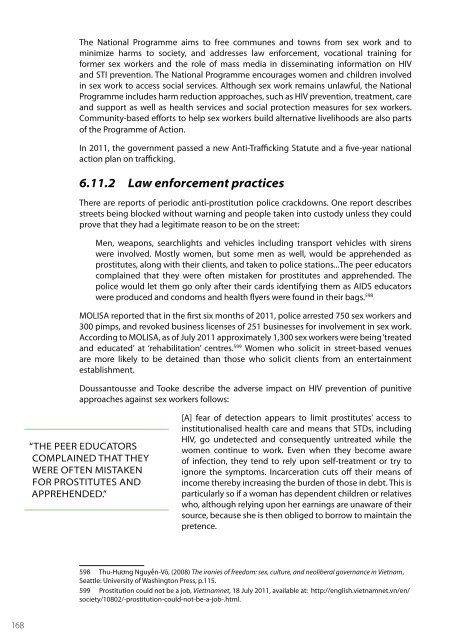SEX WORK AND THE LAW - HIV/AIDS Data Hub
SEX WORK AND THE LAW - HIV/AIDS Data Hub
SEX WORK AND THE LAW - HIV/AIDS Data Hub
Create successful ePaper yourself
Turn your PDF publications into a flip-book with our unique Google optimized e-Paper software.
The National Programme aims to free communes and towns from sex work and to<br />
minimize harms to society, and addresses law enforcement, vocational training for<br />
former sex workers and the role of mass media in disseminating information on <strong>HIV</strong><br />
and STI prevention. The National Programme encourages women and children involved<br />
in sex work to access social services. Although sex work remains unlawful, the National<br />
Programme includes harm reduction approaches, such as <strong>HIV</strong> prevention, treatment, care<br />
and support as well as health services and social protection measures for sex workers.<br />
Community-based efforts to help sex workers build alternative livelihoods are also parts<br />
of the Programme of Action.<br />
In 2011, the government passed a new Anti-Trafficking Statute and a five-year national<br />
action plan on trafficking.<br />
6.11.2 Law enforcement practices<br />
There are reports of periodic anti-prostitution police crackdowns. One report describes<br />
streets being blocked without warning and people taken into custody unless they could<br />
prove that they had a legitimate reason to be on the street:<br />
Men, weapons, searchlights and vehicles including transport vehicles with sirens<br />
were involved. Mostly women, but some men as well, would be apprehended as<br />
prostitutes, along with their clients, and taken to police stations...The peer educators<br />
complained that they were often mistaken for prostitutes and apprehended. The<br />
police would let them go only after their cards identifying them as <strong>AIDS</strong> educators<br />
were produced and condoms and health flyers were found in their bags. 598<br />
MOLISA reported that in the first six months of 2011, police arrested 750 sex workers and<br />
300 pimps, and revoked business licenses of 251 businesses for involvement in sex work.<br />
According to MOLISA, as of July 2011 approximately 1,300 sex workers were being ‘treated<br />
and educated’ at ‘rehabilitation’ centres. 599 Women who solicit in street-based venues<br />
are more likely to be detained than those who solicit clients from an entertainment<br />
establishment.<br />
Doussantousse and Tooke describe the adverse impact on <strong>HIV</strong> prevention of punitive<br />
approaches against sex workers follows:<br />
“<strong>THE</strong> PEER EDUCATORS<br />
COMPLAINED THAT <strong>THE</strong>Y<br />
WERE OFTEN MISTAKEN<br />
FOR PROSTITUTES <strong>AND</strong><br />
APPREHENDED.”<br />
[A] fear of detection appears to limit prostitutes’ access to<br />
institutionalised health care and means that STDs, including<br />
<strong>HIV</strong>, go undetected and consequently untreated while the<br />
women continue to work. Even when they become aware<br />
of infection, they tend to rely upon self-treatment or try to<br />
ignore the symptoms. Incarceration cuts off their means of<br />
income thereby increasing the burden of those in debt. This is<br />
particularly so if a woman has dependent children or relatives<br />
who, although relying upon her earnings are unaware of their<br />
source, because she is then obliged to borrow to maintain the<br />
pretence.<br />
598 Thu-Hương Nguyễn-Võ, (2008) The ironies of freedom: sex, culture, and neoliberal governance in Vietnam,<br />
Seattle: University of Washington Press, p.115.<br />
599 Prostitution could not be a job, Viettnamnet, 18 July 2011, available at: http://english.vietnamnet.vn/en/<br />
society/10802/-prostitution-could-not-be-a-job-.html.<br />
168
















